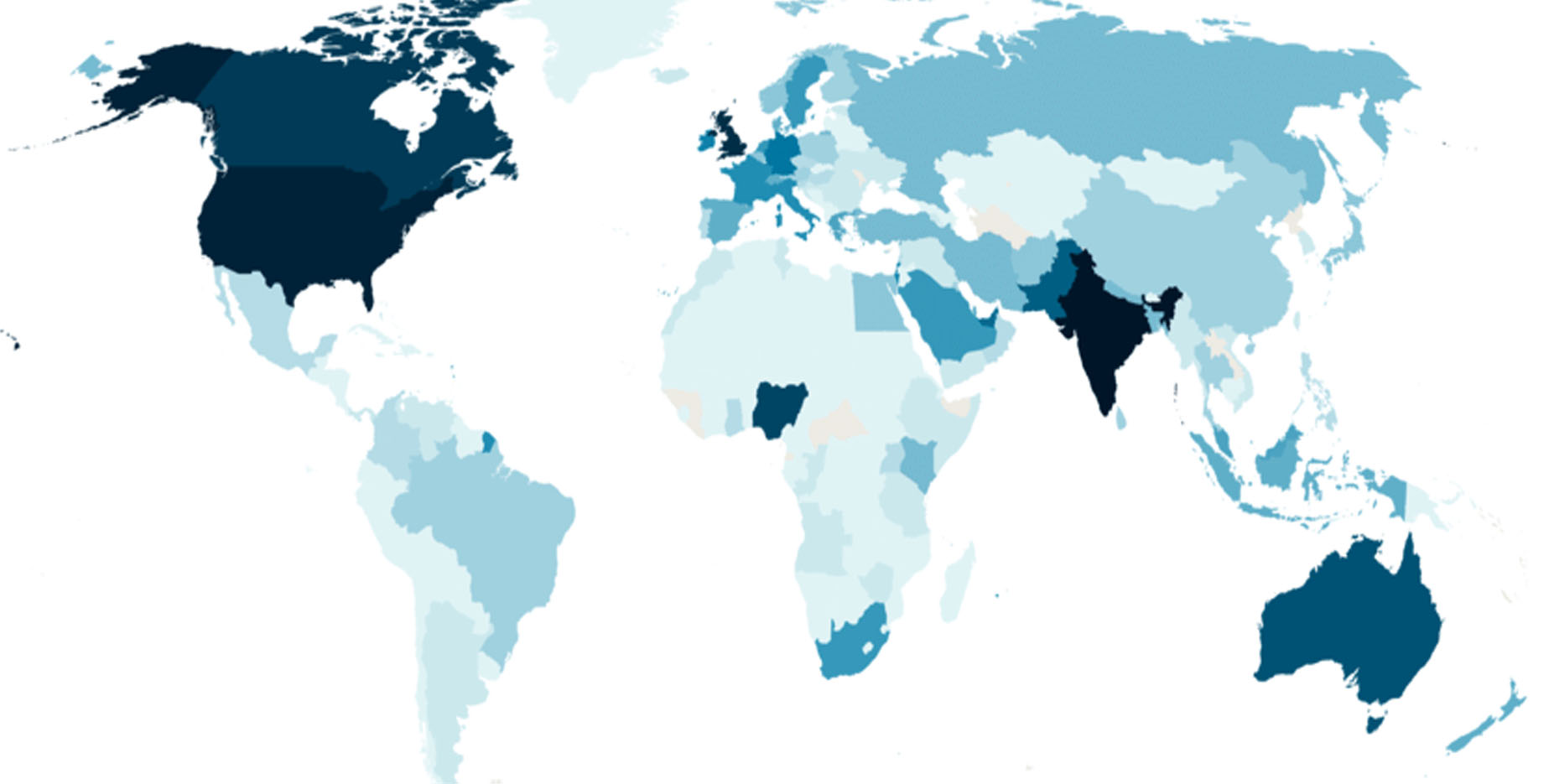
Map: Choropleth map where countries are coloured by number of geolocated Islamophobic tweets. (Credit: Islamic Council of Victoria)
Nadine Osman
Nearly 86 per cent of anti-Muslim posts on social media originate in the United States, the United Kingdom and India, according to a report from the Islamic Council of Victoria.
A total of 871,379 Islamophobic tweets were sent from August 28, 2019, to August 27, 2021, in India, 289,248 in the US, and 196,376 in the UK.
The report, titled Islamophobia in the Digital Age, notes that the Islamophobia rampant in India is due to the normalisation of hatred against Muslims by the ruling Bharatiya Janata Party (BJP).
In the US, however, Islamophobia has long been a problem that “has been dramatically exacerbated by the racist, conspiratorial, and inflammatory rhetoric of Donald Trump,” the report says.
“Consistent with a role for social media, Trump’s tweets on Islam-related topics are highly correlated with anti-Muslim hate crime after, but not before the start of his presidential campaign, and are uncorrelated with other types of hate crimes,” conclude the authors.
As for the UK, the prevalence of anti-Muslim tweets was attributed to a multitude of factors, including the global reach of Trump’s hatred, the country’s longstanding issues with the anti-migrant sentiment, and the casual racism of former Prime Minister, Boris Johnson, the report wrote.
According to the Islamic Council of Victoria, there were at least 3,759,180 Islamophobic posts made on
Twitter between August 28, 2019, and August 27, 2021. After nearly one year, 85 per cent of the hateful tweets were still online; only 14.8 per cent were eventually removed, either because they had been hidden through privacy settings, taken down by users, or deleted by moderators.
“We conclude from this that Twitter is drastically failing at removing anti-Muslim content,” the report noted.
“This is unsurprising given that they do not automatically screen posts for hate, but rather only act once a report has been filed. In practice, however, even when Islamophobia is brought to their attention, a mere 3 per cent of flagged tweets end up being removed.”
There were three common themes observed in anti-Muslim tweets: the association of Islam with terrorism, the depiction of Muslim men as perpetrators of sexual violence, and the fear of sharia law being imposed on others.
Other types of tweets included conspiracy theories that Muslims are being sent as migrants to out-reproduce non-Muslim communities, the targeted harassment of Muslim public figures and the characterisation of halal slaughter as inhumane.
When there is a terrorist attack in the West, anti-Muslim hate is more likely to be prevalent online than when attacks occur elsewhere. More than 6,264 anti-Muslim tweets were recorded when more than 50 people were beheaded in Mozambique.
After the London Bridge stabbing, there were over 10,000 anti-Muslim tweets.
The report also found that how politicians respond to events connected to Islam can have an impact on Islamophobia. It was found that the third largest spike in anti-Muslim tweets on February 25, 2020, for example, was a result of hateful remarks by the BJP against Muslim opponents of its Citizenship Amendment Act.
According to a newly released report by Statistics Canada, hate crimes against Muslim communities across Canada increased by 71 percent in 2021. The study found that the number of recorded attacks against Muslims rose from 84 incidents in 2020 to 144 in 2021. In 2019, there were 182 incidents reported targeting Muslims, a decline from the previous year.
To combat this hatred, the Islamic Council of Victoria recommends several steps, such as introducing penalties for platforms that fail to act to prevent Islamophobia and pressuring the Indian government to end anti-Muslim rhetoric.
The 2019 Christchurch Mosque attack is illustrative of this vicious cycle. The gunman was radicalised by anti-Muslim online content, and in the week after he murdered 52 Muslim worshippers, incidents of anti-Muslim abuse spiked upwards by a staggering 1300 percent in New Zealand and 600 percent in the UK, which triggered or inspired a wave of anti-Muslim violence in England and Scotland, including an attack on a mosque in Stanwell, and stabbing of a Muslim teenager in Surrey.
Twitter, along with Google, and Meta, promised to eliminate anti-Muslim content from its platform in 2019 – in the wake of the Christchurch mosque terrorist attack. However, as highlighted by the Center for Countering Digital Hate, which found that social media companies, including Twitter, have failed to act on 89 percent of posts containing anti-Muslim hatred reported to them.
A recent report documented over 800 attacks against mosques by right-wing extremists in Germany since 2014.
The Islamic Council of Victoria suggests that Twitter should end its policy of not screening tweets and should instead automatically detect and remove hateful content. It also recommends that Twitter establish an independent oversight body to oversee the effectiveness of its moderation policies.